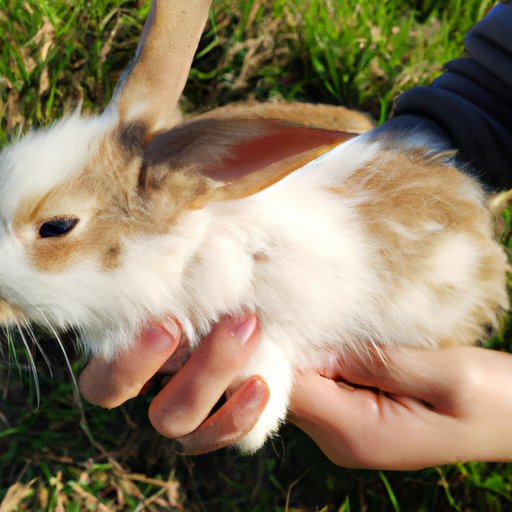
I. Introduction
For gardeners and farmers, rabbits can be both adorable and frustrating creatures. While it might be enjoyable to see them hop around, their voracious appetite for plants and vegetables can cause serious damage to gardens. Those who encounter rabbit problems often wonder what the best ways are to get rid of rabbits and keep them away without harming them. This article provides an overview of some effective and humane methods.
II. Natural deterrents
Natural deterrents are a great way to keep rabbits away from your garden. One of the most effective natural deterrents is planting garlic, onions, and marigolds. These plants contain compounds that rabbits don’t like, and they can help keep them away from your garden. To use these plants as a deterrent, you can plant them around the perimeter of your garden or mix them in with other plants.
Another natural deterrent is cayenne pepper. Sprinkle it around the plants that rabbits tend to munch on, and it should keep them away. You can also try spreading human hair or using predator urine. Rabbits are naturally wary of predators, and the smell of predator urine is usually enough to scare them off.
III. Predator urine
Predator urine is a popular way to scare off rabbits. You can buy predator urine online or at a garden supply store. To use it, simply sprinkle it around the perimeter of your garden. The smell of predator urine should be enough to scare off rabbits and prevent them from coming back.
One downside of using predator urine is that it needs to be reapplied frequently. Rain can wash away the scent, and you’ll need to reapply it after every rain. Additionally, some people find the smell of predator urine unpleasant.
IV. Fencing
Fencing is one of the most effective long-term solutions for keeping rabbits out of your garden. You can buy rabbit-proof fencing online or at a garden supply store. The fence should be at least two feet high and bury at least six inches into the ground to keep rabbits from digging underneath it. Additionally, make sure the fence is tight to the ground, as rabbits can squeeze through small gaps.
One downside of using a fence is that it can be expensive to install. Additionally, some people may find a fence visually unappealing or inconvenient for accessing their garden.
V. Traps
Live traps are a humane way to catch and release rabbits. To use a trap, place it near the area where you’ve seen rabbits and bait it with something they like to eat, like carrots. When a rabbit enters the trap, it triggers a door to close behind it, trapping the rabbit inside. You can then release the rabbit in a safe location far away from your garden.
When choosing a trap, make sure to choose one that’s designed for rabbits. Some traps are designed for smaller animals and may be too small for a rabbit. Additionally, check your local laws before using a trap, as some municipalities may have regulations regarding trapping animals.
VI. Motion-activated sprinklers
Motion-activated sprinklers are a high-tech way to scare off rabbits. When a rabbit enters the area, the sprinkler will turn on and spray water, scaring the rabbit away. You can buy motion-activated sprinklers online or at a garden supply store.
While motion-activated sprinklers are effective, they can be expensive and may not be practical for everyone. Additionally, they require a water source and can use a lot of water if you use them frequently.
VII. Repellent sprays
Rabbit repellent sprays can also be an effective way to keep rabbits out of your garden. These sprays contain compounds that rabbits don’t like, and they can deter rabbits from coming near your plants. To use them, simply spray them on the leaves of your plants or the perimeter of your garden.
When choosing a rabbit repellent spray, make sure to choose one that’s safe for use around plants and animals. Some sprays can be harmful to the plants or pets in your yard.
VIII. Conclusion
There are several effective and humane ways to keep rabbits out of your garden. Some options, like natural deterrents and repellent sprays, are easy to use and relatively inexpensive. Others, like fencing and motion-activated sprinklers, can require more time and money to install. Regardless of which method you choose, it’s important to remember that rabbits are a valuable part of our natural world and should be treated with respect. Try out the solutions discussed in this article, and enjoy a rabbit-free garden!
If you have additional tips or considerations for dealing with rabbit problems, share them in the comments below.
Call to action: Don’t let rabbits take over your garden.





